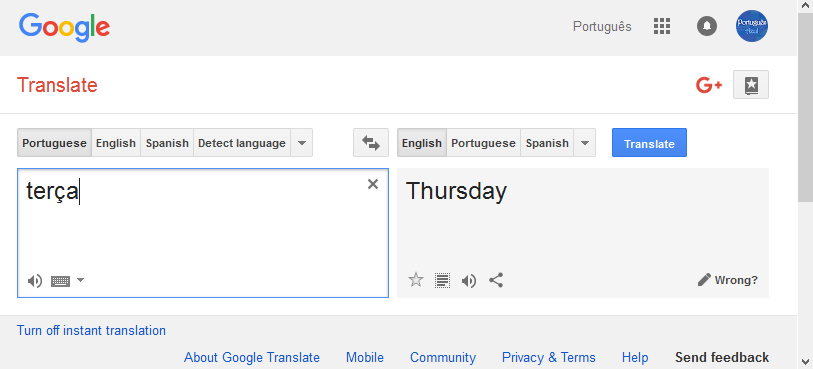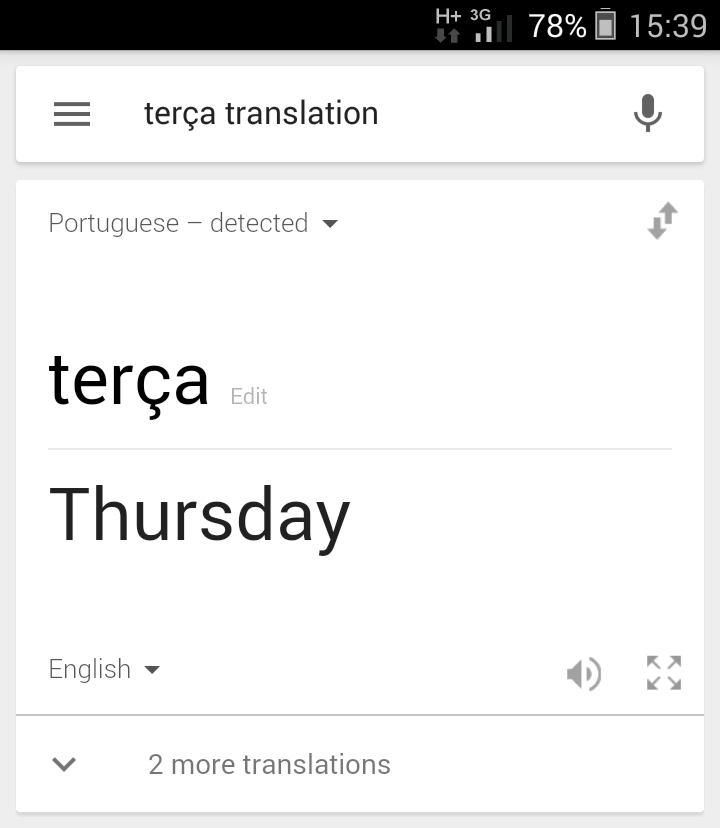Posted on September 5, 2015
When Google Translate Fails (Portuguese-English)

Google Translate was launched in 2006 and it’s service has improved a lot in the last few years. It has definitely overtaken many other language services and nowadays it is, by far, the most accessed language tool in the world.
Recently, it has added a new feature which is absolutely amazing, the “word lens” feature, which can translate straight away from your mobile phone camera and create the illusion of translating the words without changing the background, or the other visual contents. For example, see the image above. It keeps a similar font and it translates the words automatically.
Still, apart from its new technological features, there is much to be developed, especially when it concerns accuracy to the Portuguese language. For example, the translation on the example (the image above) is terrible. Here is a quick analysis:
Google Translate: The Life and Works of Turner = O Vida e Obras de Torneiro
Correct Translation: The Life and Works of Turner = A Vida e as Obras de Turner
First mistake: Gender. It’s A VIDA (feminine), not O VIDA.
Second mistake: Plurality. Differently from English, in Portuguese we usually add an article for plural and in this case it should be “as obras”.
Third mistake: Name. Who is Torneiro?? Is it Torneira’s husband? (torneira means “sink tap” in Portuguese). That’s a very bad guess by Google translate. Why is it trying to translate the painter’s name to a name or word that doesn’t even exist in Portuguese?
Here is a list of the main problems that I found when using Google Translate (Portuguese-English).
Completely Wrong Translations
A student of mine wanted to reschedule her Portuguese lesson and then I texted her in Portuguese: “Venha na terça! (Come on Tuesday!)”. But then, she showed up on Thursday! I asked her: “what happened?” And she replied that Google Translate says that “terça” means Thursday. What an absurd! And by the date of today (September 2015), the same mistake is still there. If you write “terça-feira” it works correctly, but natives tend to abbreviate the week days (segunda, terça, quarta, etc.) and if you type only “terça” it shows the wrong weekday. Funny enough, that doesn’t happen on the mobile phone app, only in the Google Translate web-based database.
Have a look on the pictures or check it by yourself (accessing it by your browser, not the app):
Multiple Meanings
A) Google Translate: The table is red. = A tabela é vermelho.
Correct Translation: The table is red. = A mesa é vermelha.
Despite the gender mistake (it should be vermelha), the table could be an object, not necessarily a table of columns. Google Translate gives us an option for changing “a tabela” to “a mesa”, but why does it choose a table of columns in the first place? I think table as a furniture object is much more common.
B) Google Translate: The girl is looking beautiful = A menina está olhando bonito.
Correct Translation: The girl is looking beautiful = A menina está bonita.
Here the problem is with meaning. The primary meaning of “to look beautiful” is not “to have a beautiful way of looking at things”, but to be well dressed, to be beautiful.
Idiomatic Characteristics
A) Google Translate: I feel like having a beer. = Eu me sinto como tendo uma cerveja.
Correct Translation: I feel like having a beer. = Eu estou com vontade de tomar cerveja.
B) Google Translate: I had my breakfast. = Eu tinha o meu café-da-manhã.
Correct Translation: I had my breakfast. = Eu tomei o meu café da manhã.
“Eu me sinto como tendo uma cerveja” sounds like “I’m having a beer pain or disease”, that’s a very weird sentence! On example A there are two mistakes. “To feel like” in Portuguese is “Ter vontade” or “Estar afim”. The second mistake, which also applies to example B, is the verb “To have”. In English the verb “To have” can also mean “To eat” or “To drink”. But Google is not prepared for these meanings, so it gets all wrong. In Portuguese you can only use “Tomar” or “Beber” for “To drink/To have a drink” and breakfast only works with the verb “Tomar”. There are many other similar cases like this, and Google will fail in most all of them. I won’t even mention slang use.
Gender
As we have seen here before, Google Translate fails when gender is a language concern. Usually words finishing with A are feminine and adjectives (colour, qualities, etc) must agree with the noun’s gender, but Goggle doesn’t seem to understand that.
A) Google Translate: The pen is red. = A caneta é vermelho.
Correct Translation: The pen is red. = A caneta é vermelha.
B) Google Translate: The pen is beautiful. = A caneta é bonito.
Correct Translation: The pen is beautiful. = A caneta é bonita.
C) Google Translate: The pen is thin. = A caneta é fino.
Correct Translation: The pen is thin. = A caneta é fina.
Subjunctive Mood
A) Google Translate: Maybe I will eat later. = Talvez eu vou comer mais tarde.
Correct Translation: Maybe I will eat later. = Talvez eu coma mais tarde.
B) Google Translate: Although he is rich, he works a lot. = Embora ele é rico, ele trabalha muito.
Correct Translation: Although he is rich, he works a lot. = Embora ele seja rico, ele trabalha muito.
C) Google Translate: When we move there we will be happy. = Quando passamos lá teremos o maior prazer.
Correct Translation: When we move there we will be happy. = Quando nos mudarmos para lá seremos felizes.
The Subjunctive Present fails most of the time, as seen in examples A and B. The Subjunctive Future fails sometimes, but on example C there are three mistakes (subjunctive conjugation, wrong verb, wrong words and meaning).
European Portuguese
Google Translate is Brazilian, but it should offer an option for other dialects. I have many students that are learning European Portuguese and they always bring me Brazilian sentences because of Google Translate, which are useless for them.
A) Google Translate: I’m working now. = Eu estou trabalhando agora.
European Translation: I’m working now. = Eu estou a trabalhar agora.
B) Google Translate: I want to talk about a fact. = Eu quero falar sobre um fato.
European Translation: I want to talk about a fact. = Eu quero falar sobre um facto.
C) Google Translate: I realized that you didn’t eat. = Percebi que você não comeu.
European Translation: I realized that you didn’t eat. = Apercebi-me que tu não comeste.
On example A the problem is just grammar. The colloquial present continuous is different in European Portuguese (see my article: Grammar Differences Between European and Brazilian Portuguese).
On example B, fato means “suit” in Portugal. So basically if you speak like a Brazilian, the same phrase in Portugal will mean: “I want to talk about a suit”.
On the last example (C), the verb “To notice” in European Portuguese is “Aperceber” and it’s reflexive. If you use “Perceber”, in Portugal the meaning will be: “I understand that you didn’t eat”. Also, if you are talking with a friend you wouldn’t say “você” but “tu”.
There are many other problems with Google Translate. Still, I think it’s a great tool. I use it a lot when I’m working with professional translations because it helps to speed up the process, but as a native of the language I know where mistakes are. If Portuguese is a foreign language to you, Google Translate can be risky, so you shouldn’t depend or trust on it completely.
If you know more crazy translations, please feel free to comment here!







Thanks for the information above,It is very difficult to recognize each word if one even not get the exact meaning in portuguese by google the world renowned search engine.
Google does fail in Portuguese translation. Even says it’s a European dialect…no no no… Brazilian is a dialect of Portuguese from Portugal. Example…juice when translated in Google is suco, but suco means punch. So the Brazilians use punch as juice interchangeably. In Portugal juice is sumo.
Thanks for this careful look at what Google does with English to Portuguese translations. For a study of Google Translate across all its languages:
http://teachyoubackwards.com
Pingback: Don’t Speak like a text book: Brazilian Slang – Learn With Me Brazilian Portuguese